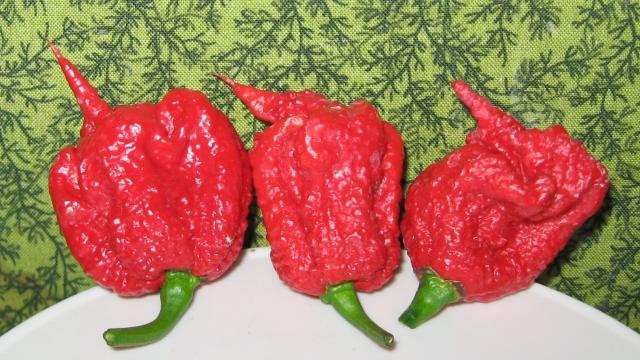For one brave man, eating one of the hottest chillis in the world came with an unexpected side effect: Days of splitting headaches that prompted a trip to the emergency room.
The Carolina Reaper, recognised as the world’s hottest pepper. Photo: Dale Thurber (Wikimedia Commons)
The unusual case, detailed in The BMJ this week, began immediately after the 34-year-old man took part in a chilli-eating contest. He ate a Carolina Reaper, the chilli christened as the world’s hottest by the Guinness Book of World Records in 2013 (though there have been several unofficial challengers to the title since).
Immediately after eating the chilli, he started dry heaving. Then he felt excruciating neck pain that soon radiated throughout his entire head. For the next several days, he would experience short but incredibly painful bursts of head pain known as thunderclap headaches. The episodes got so bad that he eventually visited the ER.
Thankfully, a brain scan didn’t reveal any major neurological issues, such as a bulged blood vessel (aneurysm) or bleeding. But several of his arteries did appear to narrow significantly, a condition called reversible cerebral vasoconstriction syndrome (RCVS).
RCVS is known to cause thunderclap headaches, and can be brought on by reactions to drugs, including cocaine and certain antidepressants. No case of RCVS has ever been associated with chilli-eating, but the main ingredient that accounts for a chilli’s spiciness – capsaicin – is known to interact with our blood vessels, either by constricting or dilating them, the doctors noted. And cayenne chilli has been rarely linked to heart attacks or suddenly constricted arteries near the heart.
“Given the development of symptoms immediately after exposure to a known vasoactive substance, it is plausible that our patient had RCVS secondary to the ‘Carolina Reaper,’” the doctors wrote.
As its name implies, RCVS typically goes away on its own within days to weeks. The man was given supportive care, and eventually his headaches disappeared completely. A brain scan taken five weeks later revealed that his arteries returned to their normal size with no lingering issues.
Medical oddity aside, these record-setting chillies aren’t typically dangerous, save to the pride of anyone who thinks they can easily take them on. Still, the doctors hope their report might help others confronted with a similarly mysterious case of unexplained headaches.
[The BMJ]
